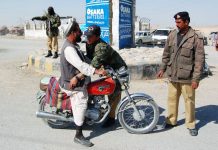Peshawar: Murtaza Khan, a trader dealing in automobile spare parts in Peshawar’s Shoba Bazaar has recently established his business in Rawalpindi and Lahore.
He says that Rawalpindi and Lahore, especially the later, are much safer than Peshawar. “Now I hardly spend 10 days a month in my hometown [Peshawar],” says Khan.
The rising rate of violence related to extortion and kidnapping in the provincial capital of Khyber Pakhtunkhwa (KP) has triggered an exodus of businessmen and industrialists who are fleeing Peshawar to safer places, leaving thousands of other people attached to these businesses jobless.
According to Khyber Pakhtunkhwa Chamber of Commerce and Industry, around 150 professionals have left the province due to the fear of extortionists.
Extortion cases in Khyber Pakhtunkhwa—the northwestern province of Pakistan plagued by militancy for the last 10 years—has registered a ten-fold increase, reveals the official data.
Data collected from the Central Police Office Peshawar puts the annual average of extortion cases during the last three years—2011, 2012, 2013— at 30 cases per year. This jumped to 285 in the first three quarters of 2014. Further breakup of the data shows 13 cases of extortion were registered in 2011, 21 cases in in 2012 and 56 cases in 2013.
Inspector General of Police of the Khyber Pakhtunkhwa province, Nasir Khan Durrani, explains the increase in the extortion cases saying earlier people were hesitant to register extortion cases with the police. “Contrary to the recent past, now people register extortion cases with the police, hoping that they would get relief from police.”
President of the Khyber Pakhtunkhwa Chamber of Commerce and Industry (KPCCI), Fuad Ishaq, says that there is a constant threat of extortion to industrialists and traders of Peshawar. “This is why, Peshawar has witnessed flight of capital as well as migration of industrialists and traders to other parts of the country,” he says.
According to Ishaq, an industrialist of Peshawar is investing 10 billion rupees in Karachi and another is investing 5 billion rupees in Lahore. He contends that shifting of capital and industry has deeper impact on a society than migration of a thousand ordinary person leaving for another city.
Says Ishaq: “Had these industrialists fleeing the city had invested their capital in Peshawar, there would have been thousands of job opportunities.This will lead to unemployment, which is one of the major causes of growing extremism in our region.”
He says life in Peshawar has been turned into the life of a captive. An industrialist and trader who can wind up business in Peshawar, he says, does not waste a moment to shift to other, safer cities of the country.
“We don’t let our children go out of home without armed guards, especially after sunset,” says Ishaq. The KPCCI chief says one can find a number of Pakhtuns now living in new sectors of Islamabad, because everyone here feels insecure.
He says that in Khyber Pakhtunkhwa province, extortion cases are on the rise in Peshawar, Charsadda, Mardan, Nowshera, Swabi, Kohat, Lakki Marwat and Bannu districts.
“If the government is sincere to bring back peace to the militancy-hit province of Khyber Pakthunkhwa, it should work to restore the confidence of the industrialists and traders by providing security,” says Ishaq. Otherwise, he fears, extremism will only grow in Khyber Pakhtunkhwa.
An official of the Intelligence Bureau, a federally-run intelligence agency, tells the News Lens that militant groups like Lashkar-i-Islam, Tehreek-i-Taliban Pakistan Mohmand and the Umer Adezai group are actively involved in extortion.
He says that unlike kidnapping, extortion is much safer and easier. He says all that criminals need for extortion is an registered mobile phone Subscriber Identity Modules (SIM) .
“Just make a call to an rich person,” says the IB official, wishing not to be named due to sensitive nature of his job . “If he surrenders to their demand then okay, otherwise a bomb blast occurs just outside his house. If the person still refuses to pay, he is killed.”
This is exactly what happened to Haji Kabal Khan, a well known fruit merchant of Peshawar. “He would pay extortion to militants on monthly basis,” the official tells News Lens. “But all of a sudden he was asked to pay a huge amount of money. Haji Kabal refused to pay which cost him his life on December 23, 2013.”
“Once you surrender and start paying extortion, it becomes a never ending process,” says Mr. Ishaq.
The IB official differs, though. “Almost all the busy doctors in Peshawar pay extortion,” he says. “This is why we have witnessed a decrease in the kidnapping of doctors.”



